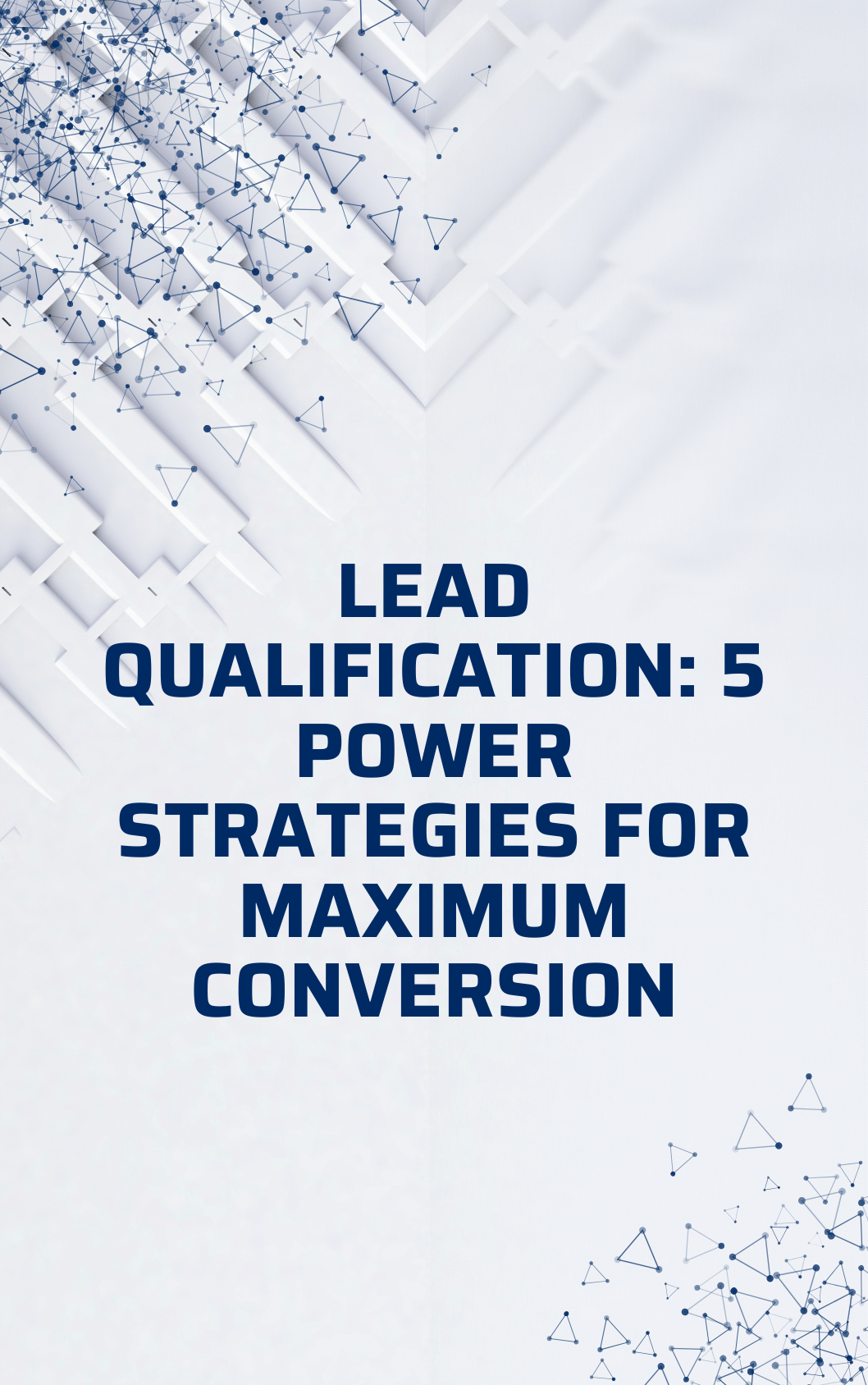TL;DR:
– B2B Lead Qualification is crucial for businesses to identify potential customers effectively.
– Efficient Lead Qualification enhances the sales funnel and boosts conversion rates.
– Key steps in Lead Qualification include defining criteria, using tools, and discerning qualified leads.
– Strategies like data analysis, innovative methods, and AI integration improve Lead Qualification.
– Overcoming challenges in Lead Qualification involves addressing common obstacles and adapting to future trends.
Introduction
In the world of Lead Generation Strategies, ‘Lead Qualification’ is more than just a buzzword. It’s a fundamental pillar that can make or break your conversion rates. With over a decade of hands-on experience, I’ll share 5 powerful strategies to turbocharge your conversion rates. Drawing on tried-and-tested approaches and techniques, this blog post will arm you with the knowledge you need to identify the most valuable leads and turn them into loyal customers. So let’s delve into the dynamic world of Lead Qualification and up your conversion game!
What is Lead Qualification?
Lead Qualification is a critical step in the sales process where potential customers or ‘leads’ are assessed based on their likelihood to become a profitable customer. Focusing the concept is key to business growth and ensuring sales efficiency.
Understanding the Concept of Lead Qualification
It involves identifying which leads are ready to make a purchase and which require more nurturing. Essentially, it helps businesses prioritize their resources, like marketing efforts, towards potential clients who are most likely to convert. It utilizes various criteria such as customer needs, budget, purchase timeline, and capability to buy.
Significance of Lead Qualification in Business
Lead qualification holds significance in ensuring business sustainability and growth. By focusing on prospects that are more likely to make purchases, companies can reduce cost and time wastage associated with pursuing the wrong leads. Additionally, the process increases sales productivity and accelerates the sales cycle.
Differences between Lead Qualification and Lead Generation
Lead generation and lead qualification are two separate but closely related processes in sales. While lead generation focuses on identifying potential customers and capturing their information, lead qualification takes it a step further by assessing these prospects for their potential to become paying customers. In other words, not all leads generated will be qualified, but all qualified leads were once generated. You can read more about the differences here.
Why is Lead Qualification Important?
An efficient lead qualification process can significantly improve the conversion rate, leading to increased revenues.
Benefits of Efficient Lead Qualification
The benefits of efficient lead qualification are numerous, including staggering improvement in conversion rates and increased sales productivity. Additionally, it promotes better targeting, value-driven engagement, and it helps build customer relationships.
The Role of Lead Qualification in Sales Funnel
Lead qualification plays a significant role in the sales funnel, acting as a filter that separates qualified leads from unqualified ones. This helps in refining marketing and sales efforts down the funnel, paving the way for effective customer acquisition strategies.
Implications of Poor Lead Qualification
On the flip side, a poor lead qualification process can result in wasted time, resources, and opportunities. It might lead to chasing prospects who are unlikely to convert, thereby affecting sales performance. Here is a useful source further explaining the implications of poor lead qualification.
Why is Lead Qualification Important?
Lead qualification is an essential aspect of the sales process, but why exactly is it so important? For starters, lead qualification ensures that salespeople are aligning their efforts with prospects that are most likely to convert into customers. This can significantly increase the efficiency of the sales process and boost revenue. By focusing on qualified leads, organizations can reduce waste and improve sales productivity.
Benefits of Efficient Lead Qualification
Effective lead qualification offers a multitude of benefits. It prioritizes sales efforts, ensuring that the sales team spends their time on high-value opportunities. Consequently, it can lead to improved sales conversion rates and increased revenue. On top of these financial benefits, efficient lead qualification can streamline the sales process, reducing the time taken to close deals, and enhancing customer satisfaction.
The Role of Lead Qualification in the Sales Funnel
The lead qualification process is a crucial stage in the sales funnel, weeding out uninterested or less likely to convert prospects. This process helps optimize the sales funnel by targeting efforts on leads highest in quality and closest to making a buying decision. In turn, this optimizes the overall effectiveness of the sales and marketing efforts and contributes to the achievement of business goals.
Implications of Poor Lead Qualification
Poor lead qualification can lead to many adverse effects, including wasted resources, lower sales conversion rates, and reduced customer satisfaction. If sales efforts are geared towards leads who have no intent to purchase, it results in wasted time and effort. This inefficiency can also lead to frustrated salespeople and can negatively impact the bottom line. Thus implementing an effective lead qualification process is essential for any business looking to increase their sales efficiency and productivity.
Note: Consider implementing lead qualification software like Marketo or HubSpot to automate the process and improve accuracy.
How Do You Perform Lead Qualification?
Lead qualification is a systematic process of assessing whether a prospective customer is fit for your product or service. This integral part of lead generation strategies requires a keen understanding of your business’s target audience and a methodology to filter out unqualified leads. So, how can you perform lead qualification effectively?
Essential Steps in the Lead Qualification Process
The lead qualification process typically follows these crucial steps: identifying potential leads, gathering information about them, assessing their interest and fit, and lastly, deciding if they are qualified and worth pursuing. Each step is crucial in ensuring an effective lead qualification as it helps identify quality prospects that are more likely to convert into customers.
Tools and Techniques for Effective Lead Qualification
The next step after defining the steps is finding the right tools and techniques. For instance, Customer Relationship Management (CRM) software like Salesforce or HubSpot can aid in collecting and managing information about potential leads. They can also provide automation capabilities to make the process more efficient. Simultaneously, implementing effective techniques like BANT (Budget, Authority, Need, Time-frame) can serve as a guideline in establishing whether a lead qualifies or not.
Recognizing Qualified vs Unqualified Leads
Identifying the distinction between qualified and unqualified leads is often a challenging part of lead qualification. Qualified leads exhibit strong interest in your products or services and have the potential to become customers. In contrast, unqualified leads show little to no interest and are likely not to convert into customers. Recognizing this difference is crucial to avoid wasting resources on unqualified leads and to concentrate efforts on those who have a high conversion potential.
Remember, an effective lead qualification is not about generating numerous leads; it’s about attracting the leads that best match your business’s target audience or ideal customer profile.
What Strategies Can Improve Lead Qualification?
Lead qualification is crucial in the sales process, but how can we refine it further to optimize results? With advanced technology and innovative methods at our fingertips, boosting lead qualification rates has never become more achievable. In this section, we will discuss several strategies that can significantly improve your company’s lead qualification process.
Innovative Methods to Optimize Lead Qualification
Integrating modern techniques is paramount, particularly when optimising the lead qualification process. Approaches such as value-based selling, where we prioritize prospects that align with the company’s value proposition, can supercharge the process. Further, nurturing relationships with leads via thoughtful and timely communication can enhance the likelihood of conversion.
Incorporating Data Analysis for Better Lead Qualification
Data analysis provides insights that can be instrumental in enhancing the lead qualification process. Interpreting lead behaviour, tracking interactions, and evaluating the source of leads can help discern the qualified leads from the unqualified ones. Visit the Salesforce blog to understand how data-driven decisions can aid in better lead qualification.
Role of AI and Machine Learning in Lead Qualification
Artificial Intelligence (AI) and Machine Learning (ML) are transforming the manner in which lead qualification is conducted. These technologies, through pattern recognition and predictive analysis, can estimate the likelihood of a lead converting into a sale. For instance, HubSpot’s AI-powered sales software bolsters lead qualification efforts by identifying high-potential leads, thereby facilitating efficient resource allocation. As AI and ML evolve, their role in improving lead qualification is becoming more significant, making them indispensable tools for businesses striving to maximize sales.
With these strategies, your business will be well-equipped to refine your lead qualification process and yield more successful conversions.
What are The Challenges in Lead Qualification And How To Overcome Them?
In the world of sales and marketing, the process of lead qualification is crucial but challenging. It demands continuous iteration, testing, and improvement. Some common hurdles can disrupt the flow of the process, subsequently affecting sales output.
Common Obstacles in the Lead Qualification Journey
Various obstacles can hinder the lead qualification process. Some of these may include inaccurate data, lack of in-depth customer understanding, the absence of a defined lead qualification criterion, and slow response times. Unreliable data can often lead to chasing the wrong leads, which is both time-consuming and costly. Furthermore, without a clear understanding of customer needs, it can be challenging to identify a potential high-value prospect.
Proven Solutions for Lead Qualification Challenges
Several strategies can help to overcome lead qualification challenges. Automation tools, for instance, can address the issue of slow response times by enabling instant follow-ups. Employing cutting-edge data analysis techniques can result in accurate profiling of potential clients, enhancing lead accuracy. Establishing a clear, structured lead scoring system can ensure that sales teams focus their efforts on high-value leads thus increasing conversion rates.
Future Trends in Lead Qualification and Adaptation Strategies
Emerging trends in the realm of lead qualification are promising. The integration of AI and machine learning can help companies further improve their lead qualification process. Training AI models using past sales data, for instance, can predict probable high-value leads. Predictive analytics can also assist in identifying buying patterns and enable businesses to refine and optimize their sales strategies. Therefore, staying updated with these trends and adapting accordingly is critical to maintain an effective lead qualification process.
Navigating these challenges effectively allows businesses to maximize their lead qualification efforts, driving growth. Therefore, understanding and overcoming these obstacles is critical in establishing a robust lead qualification process. Now, let’s conclude our discussion on lead generation.
Conclusion:
In the realm of b2b lead qualification, the power lies in the depth of strategy. By effectively implementing the 5 key strategies detailed in this article, businesses can maximize conversion rates and capitalize on qualified leads. Understanding the nuances of lead qualification is crucial for sustained growth and success. As you delve deeper into the world of Lead Qualification, explore our other insightful resources to sharpen your skills and stay ahead in the competitive landscape. Embrace these strategies, and watch your conversion rates soar to new heights!


